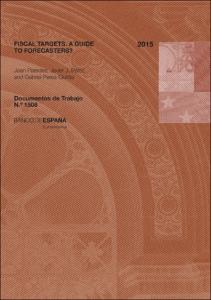Fiscal targets. A guide to forecasters?
Authors
Issue Date
24-Mar-2015
Physical description
37 p. : gráf., tab., fórmulas
Abstract
¿Debería tomar en consideración un analista en su proceso de toma de decisiones los anuncios del Gobierno sobre las políticas que implementará en el futuro? Para responder a esta pregunta, el analista podría combinar en un modelo la siguiente información: 1) la política/objetivo anunciada por el Gobierno y 2) la información disponible sobre las políticas que de hecho está implementando el Gobierno. Esta es la aproximación que tomamos en el presente trabajo. Formulamos y estimamos modelos empíricos para un conjunto de países de la UE (Alemania, Francia, Italia y España) y mostramos que los objetivos oficiales de gasto (consumo público) proporcionan información útil sobre la política de gasto (consumo público) efectivamente realizada a posteriori en situaciones en las cuales se instrumentan cambios significativos en las políticas (incluso cuando el cumplimiento de dichos planes en el pasado fue escaso) y cuando hay información limitada sobre el grado de implementación efectiva de los planes en curso (esto es, a principios del año presupuestario). Nuestros resultados complementan y cualifican una rama muy influyente de la literatura, que tiende a encontrar que los objetivos oficiales incorporan sesgos sistemáticos significativos
Should rational agents take into consideration government policy announcements? A skilled agent (an econometrician) could set up a model to combine the following two pieces of information in order to anticipate the future course of fiscal policy in real-time: (i) the ex-ante path of policy as published/announced by the government
(ii) incoming, observed data on the actual degree of implementation of ongoing plans. We formulate and estimate empirical models for a number of EU countries (Germany, France, Italy and Spain) to show that government (consumption) targets convey useful information about ex-post policy developments when policy changes significantly (even if past credibility is low) and when there is limited information about the implementation of plans (e.g. at the beginning of a fiscal year). In addition, our models are instrumental in unveiling the current course of policy in real time. Our approach complements a well-established branch of the literature that finds politically motivated biases in policy targets
Should rational agents take into consideration government policy announcements? A skilled agent (an econometrician) could set up a model to combine the following two pieces of information in order to anticipate the future course of fiscal policy in real-time: (i) the ex-ante path of policy as published/announced by the government
(ii) incoming, observed data on the actual degree of implementation of ongoing plans. We formulate and estimate empirical models for a number of EU countries (Germany, France, Italy and Spain) to show that government (consumption) targets convey useful information about ex-post policy developments when policy changes significantly (even if past credibility is low) and when there is limited information about the implementation of plans (e.g. at the beginning of a fiscal year). In addition, our models are instrumental in unveiling the current course of policy in real time. Our approach complements a well-established branch of the literature that finds politically motivated biases in policy targets
Publish on
Documentos de Trabajo / Banco de España, 1508
Subjects
Credibilidad de la política económica; Política fiscal; Previsión económica; Policy credibility; Fiscal policy; Forecasting; Fluctuaciones y ciclos económicos; Déficit y deuda públicos; Política fiscal; España; Alemania; Italia; Francia
Appears in Collections:












